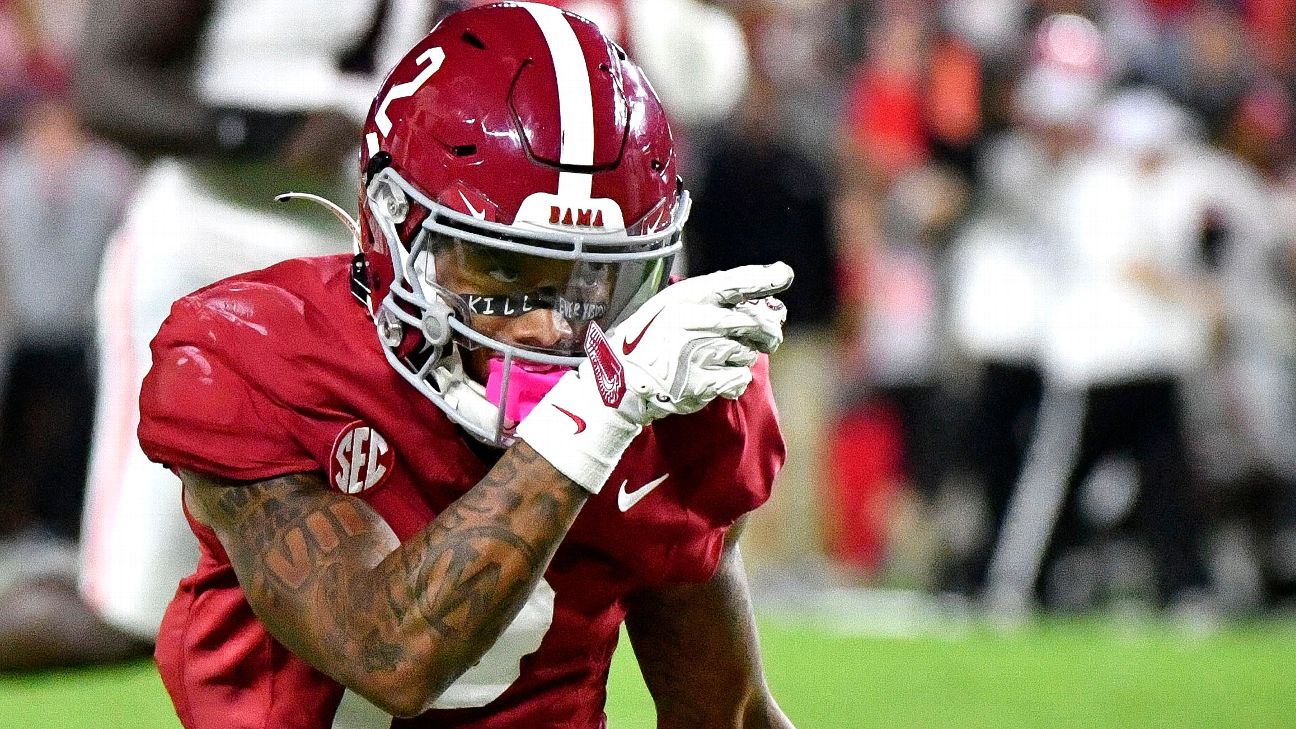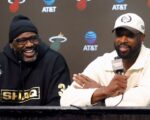Editor’s note: This story is an excerpt from the book «American Kings: A Biography of the Quarterback,» which will be available on Sept. 9 from Disney Publishing’s Hyperion Avenue.
SENIOR NIGHT AT Isidore Newman School in Uptown New Orleans. Class of ’23. A warm October sunset. A tunnel of cheerleaders under the lights, with a line of football players waiting to have their names announced and to meet their parents at midfield, and little surprise over who will be called first.
He’s in full uniform, wearing a kelly green jersey, with a white number 16. He stands, slightly tilting back and forth, waiting. The field is bright and clean. He turns to his coach beside him.
«Do I run?» Arch Manning asks.
He is the top-rated high school quarterback in America. His talent and production and work ethic merit the status, but it’s his name that makes the future feel inevitable. He’s a Manning. His grandfather is Archie, a Southern icon. His Uncle Peyton is a two-time Super Bowl champion, a national icon. His Uncle Eli is a two-time Super Bowl champion, which in New York gets you pretty close to icon status. Arch knows no other kind of life. There’s no hiding.
The crowd buzzes. A fervor awaits. The structures framing the stadium at Newman seem to mirror stages of his life. He’d started playing, almost as soon as he could walk, on the playgrounds behind the north end zone. Parallel to the sidelines are classrooms and buildings where he went to elementary school and then high school. As he approaches the south end zone, seventeen years old and at the beginning of something, he stands in the shadows of Manning Fieldhouse, named in honor of his father and uncles, all Newman alums. Tonight, as a senior, he commands the stage with little left to prove. In three months, he will be a freshman at the University of Texas. Anything other than a college career that ends with him being the first overall draft pick will seem like potential unfulfilled, an expectation both comically unfair and a reality of the life he has chosen.


1 Related
Coach Nelson Stewart looks back at Arch. Stewart played with Peyton when they were young. He’s known Arch since he was running on that kindergarten playground. He looks out to midfield now, to Arch’s parents, Cooper and Ellen.
«Do a smooth jog,» Stewart says.
«How fast?»
«Not fast.»
You can make the case that Arch Manning wasn’t born on April 27, 2004, but on October 4, 1969. That night, Archie Manning’s Ole Miss Rebels played Alabama. Archie was a handsome junior from Drew, Mississippi, a gifted, gritty kid carrying a deep hurt and living out a tireless urge to prove himself after his father’s death by suicide. He liked the position of quarterback. He studied those who played it, even as a kid. He reveled in the responsibility and the status it afforded him. It felt comfortable, manageable, an extension of self and ability. This was the first nationally televised night game in college football history. Archie threw for 436 yards and ran for 104 more, accounting for five touchdowns in a one-point loss, in what is now considered one of the greatest games of all time. He cried when the game ended. He was a legend, a folk hero, a song title, an All-American before he took an NFL snap, and even though he couldn’t have known it at the time, he was the beginning of a family franchise that would show no signs of slowing down almost six decades later. Arch was part of a lineage before he was a glint in Cooper and Ellen’s eyes. When Arch played fifth-grade flag football, Stewart and Cooper talked about moving him up to the middle school team but decided to keep him where he was, staving off the mania that awaited him. When he started high school, college coaches circled.
Jarmone Sutherland. Newman had a slant route called, but this was inviting. Sutherland turned to Arch, wondering what to do. Arch gently tugged his face mask, signaling him to go deep.
Arch had already shown promise at the essential thing: throwing the ball. That was evident from the start, when he was playing flag football in fifth grade. «He had a good throwing motion,» Uncle Eli says. But what stood out to Eli is that «it made sense to him. Some people, they pick up a ball, and it just works.»
Every aspiring quarterback must decide at some point: Are you about this world? Are you willing to do what it takes? Do you want to leave the old version of yourself behind? Do you possess all of the strange traits–talent, smarts, drive, luck, the combination of broken in the right places and healed in the right places–to do it? There’s a chrysalis, a metamorphosis that takes place. It happened to Peyton and Eli. Both faced choices about what they were willing to sacrifice. As boys, these men dedicated their lives to this job.
Archie and Cooper and Peyton and Eli all tried to shield Arch. They wanted football to be fun. In flag football, Arch loved throwing touchdowns to his friends. But when Cooper took him to games, NFL or college, Arch barely said a word.

Watch college football and much more in the newly enhanced ESPN App. Stream the biggest games
IT WAS EASY to get swept up in Arch and all the buzz, his every act being viewed through the prisms of precociousness and prelude, even for coach Nelson Stewart. As a freshman, Arch threw 38 touchdowns in eleven games. There was one game where Arch struggled, throwing a few interceptions, which is memorable to Stewart not only because it was the exception but because of what he saw. Every quarterback needs to find a way to bury doubt; the Mannings were no different. Stewart looked at Arch’s eyes as he came off the field. Arch was overwhelmed and stressed and looked . . .young. «I had to remind myself that he’s just a kid,» Stewart says.
Was it already too late? A documentary crew had called Cooper and asked if Arch wanted to be featured alongside some of the game’s legends, including John Elway. Cooper loved the idea but couldn’t do that to his kid. Archie created headlines when he told a reporter that his grandson was «a little ahead of» his sons when they were freshmen. What was intended as a simple observation of fact–neither Peyton nor Eli had started on varsity as freshmen–became a family member upping the hype and went viral, not just on recruiting sites and college message boards, but on actual news outlets. Stewart says that Arch was the first freshman to start an opener in school history.
When Arch was a sophomore, Stewart and Cooper met to lay out a plan. Both men felt like they were staring at a tsunami taking form in the distance.
«What do we want this to look like?» Stewart asked Cooper.
«We’re gonna do a 1975 recruitment,» Cooper said.

This story is based on reporting from ESPN senior writer Seth Wickersham, whose book «American Kings: A Biography Of The Quarterback» is to publish in September by Hyperion Avenue, a division of The Walt Disney Company, the parent company of ESPN.
Arch was nominally aware and acutely oblivious to it all. He just went about his thing, existing, playing golf, watching every episode of «Friday Night Lights,» and playing quarterback. He was self-assured, cocky but endearing, good-natured and calm. Arch had Peyton’s situational intensity, Eli’s situational indifference, Cooper’s situational savvy, and his own sincerity. He was a byproduct of the entire Manning infrastructure, the receptor of every aspect of quarterback intelligence that this iconic family had learned through the decades. He had a quick release, an inheritance and the result of hours of work with his uncles and coaches. He went to Tulane for arm care. He had a huge trunk, thick thighs, and a quick torso, honed from drills useless in any other field. One day Arch sat in on a meeting with New Orleans Saints coaches and scouts as they evaluated the quarterbacks in that year’s draft.
Grandpa Archie seemed more engaged with his grandson’s recruitment than he had been with his own kids’, often leaving Stewart long voice memos. Uncle Eli was there to answer any of Arch’s questions, but he knew better than to impose–he had been in Arch’s shoes, as the youngest taking on this job and all that attended it. But the benefits were undeniable.
Arch and Cooper flew from New Orleans to Denver, where Uncle Peyton lived. They worked out at the Broncos facility. Peyton also got Clyde Christensen, a longtime NFL offensive coach who’d worked with him in Indianapolis and Tom Brady in Tampa Bay, to send private videos of Brady’s practices, melding the best of Manning’s theories with Brady’s techniques, two legends funneling into a boy. Peyton texted them to Stewart, telling him to run those drills. There were dozens of video clips.
Arch visited Clemson twice, Alabama four times, Georgia four times, Texas four times, Ole Miss a few times, LSU, and even Virginia. Of all places, Cooper liked Virginia for his son for one reason: It wasn’t a football crazy school. He could live under the radar. His older sister, May, was a student there. As Cooper and Arch walked through campus, the father saw an opportunity for something close to peacefulness. «You could come here, be a normal guy,» Cooper told him. «No one’s gonna mess with you.»
Cooper wasn’t a classic quarterback dad, but he was learning fast and wasn’t afraid to be cutthroat. Peyton would sometimes hop on the phone with Stewart after games, going through play-calling, and then would follow up a day later wondering if the school needed any donations. Eli, meanwhile, would purchase thousands of dollars of equipment for Newman without telling anyone. New shoulder pads would just show up.
Stewart taught five classes a day. Visiting coaches learned his schedule. Tuesdays at 10 a.m., Stewart’s job was to watch Newman’s pre-K kids on the playground where Arch had once played. College coaches, with nothing better to do, pitched in. Pete Golding, then Alabama’s defensive coordinator, pushed kids on the swings. So did Bill O’Brien, then the Tide’s offensive coordinator. Nobody minded; they were with Stewart. Texas coach Steve Sarkisian showed Arch the play sheet from Alabama’s national championship over Ohio State when he was a Crimson Tide assistant. Golding would FaceTime Sarkisian from Stewart’s office, just to tweak him.
Ever the offensive lineman, Stewart tried to protect his quarterback, lead-blocking through fans after games to get Arch to his car. Other times, the backup quarterback, Christian Sauska, would come out and claim to be Arch and pose for selfies. Never in the history of humankind has it been easier to check a face, famous or otherwise, yet people fell for it.
One day Golding took a photo of his dip cup on Nelson’s desk and texted it to Sarkisian, his buddy: «Guess where I am?» Sark started to freak out and he rapid-texted Stewart. On another day, Sarkisian pranked Kiffin by saying that he’d spoken with Arch at least one hundred times. Sure enough, Kiffin exploded on the other end of the phone.
One day, someone sent Stewart a link. It was for an Arch Manning autographed football. The price: $957. It was almost impossible for him to process. He showed it to Cooper, who shook his head and lamented.
«Put my last name on it . . .»
NOBODY KNEW WHERE Arch Manning wanted to go to school. Some in the family preferred Georgia, where head coach Kirby Smart would coach him hard. Others, Alabama. The problem for Alabama was that Nick Saban — whom the Crimson Tide assistants affectionally called «Daddy» — was getting up there in years, and nobody knew how long he’d be there. Texas kept lingering. Competition was so fierce that everything was fair game. It was public record that Steve Sarkisian had battled alcoholism, a disease that nearly cost him his career. Sark had rebuilt his life and work in recovery. But during one Zoom call with Arch, Golding was discussing Alabama’s schematics and culture, and then he went there.
«I love Sark,» Golding said. «He’s my best friend.» He paused. «I hope he can stay sober.»
After the Zoom ended, Stewart called Golding. «Pete, that’s f—ed up!»
Golding knew. He had no choice.
«Daddy’s on me.»
In June of 2022, Nelson Stewart served as a counselor at the Manning Passing Academy in Thibodaux, Louisiana, the annual camp in the sticks that’s as much of a tour stop on the high school quarterback junket as Elite 11, thirty-some years strong. Arch has been at the camp since he was in middle school and is the most tenured attendee in the camp’s history. Stewart was overseeing a drill at another camp, due to arrive to Thibodaux late, when he looked at his phone and saw that he had missed five calls from Arch. He wondered if something was wrong. He called back. Cooper answered.
«Someone wants to talk to you,» Cooper said.
«Coach,» Arch said, «I just want to thank you for everything you’ve done for me and how you’ve handled it. I just want to let you know that I’ve decided to formally commit and play at Texas.»
He liked Sark. He especially liked that Sark was the head coach and the play-caller, increasing the odds that he’d be there for the duration of Arch’s time. Texas was a good school, in case he were to suffer a career-ending injury. He liked that Texas was joining the Southeastern Conference. Texas had just finished an 8-5 season when he committed; he wanted to be part of an upswing, of bringing something back.
Holy s–t! Stewart thought. «I’m proud of you,» he said. He started to well up. Arch told him he needed to call more people before news broke. «Coach, I’ve got a lot of people to thank.»
«You’re good,» Stewart said.
«Do me a favor,» Arch said. «Don’t tell anybody. It’s a secret.»
Within minutes, A.J. Milwee, Texas’s quarterbacks coach, called.
«What’s up?» Stewart said, knowing exactly what was up. They danced around the obvious.
«I can’t talk,» Milwee said. «But I can’t believe this, we did it.»
«Yeah, man. I’m so happy for you.»
News broke. Texts flooded in from coaches who had been a part of Stewart’s life for the past few years. Alabama’s Pete Golding called Stewart. Saban wanted an explanation.
«Why Texas?» Golding asked.
Stewart listed all the reasons, including that Arch had once said that he felt Austin was big enough that he wouldn’t be recognized.
«Stop,» Golding said. «No motherf—ing way.»
YOU KNOW THE moment. It happens every game. When the quarterback takes over. When he creates and alters momentum, when he separates himself, when we know, everyone knows, why this job is different. Arch Manning’s seminal moment is in the third quarter of a close game on Senior Night, closer than expected. The Greenies face third-and-29. There are no plays for that situation. Arch gets the ball. He stands in the pocket as it breaks from behind, and skips forward, eyes downfield, until nobody obstructs his view, and he sees a chance, a deep post route. He sets. He’s at his own 26-yard line. The ball launches into air, above the stadium lights and into the darkness, then down again, nose over nose until it drops at the opponent’s 15-yard line, into the arms of his receiver for a first down, 60 yards traveled in all. The local television broadcaster says wow four times, yet that seems insufficient.
After Newman wins, players gather in the end zone. Stewart addresses them. Arch is on a knee, toward the back. Stewart paces, calling out high and low points. Then he stops. He holds a ball.
«I’m about to embarrass him,» he says.
Arch looks down. He had started Senior Night by sitting with the freshmen at the team dinner; it was important to him to connect with every player, regardless of stature or age. He’s ending it with a reminder of who he is, was, and where he’s going.
«I’d argue tonight was his toughest game,» Stewart says. «He got hit a bunch. He got up every time. He didn’t yell at the line once. He kept his poise. That’s what being a leader is. Now Arch has 129 career touchdowns. He’s our career leader.»
The team applauds.
Arch brings the team together and gives them a rally cry for the night. The kids disperse, toward the fence separating the stands from the field. Parents and friends gather. Seniors pose for selfies. Arch wanders over, his path stopped for a photo or autograph, half dozen in all. A life is just beginning, and Arch has yet to face the crossroads that his famous family members did. In two months, he would clean out his locker. It was a mess. Cooper shook his head. Arch sifted through stuff, tossing things away as he went, when both men noticed something buried in the back and at the bottom. It was a trophy. It had a football player kneeling. It was what he’d been awarded when he won the Bobby Dodd National High School Player of the Year from the Touchdown Club of Atlanta. Archie had won Touchdown Club’s version of the award in 1969. Peyton had won it in 1993. Eli had won a different award from the same club in 2003. Cooper told Arch that it should be in his room or in a trophy case. Arch gave it to his dad to figure out. In three months, he’d be a freshman at Texas, and property of the public in an even greater way than he is now.
In 2024, after he got his first career start and helped the Longhorns defeat Louisiana-Monroe, the life he knew would change; something he had prepared for and thought about caught him by surprise. Kids wanted his photo as he walked through campus. Dinners out took on a new meaning. He could not hide in Austin, and in fact he was easier to spot than ever. You think you know when you’re starting to lose control of your life, but you don’t until it happens. He texted Eli: Can we chat for little bit? Eli figured it was to talk ball. It was to talk fame. How do you handle this stuff ? Eli had a few rules. It’s okay to say no. It’s okay to tell people to wait until after dinner. Tell the team: No photos with anyone drinking alcohol. If you blink at the wrong time holding a beer, it’ll live on the internet forever, coming up after the inevitable bad game. They were tips, but not answers. Eli didn’t offer solutions. There are none.
One morning after Arch is gone, Stewart is at his office when he gets word that Peyton is going to stop by Isidore Newman the next day. He won’t be alone. He’ll be with his young teenage son, Marshall.
They need a place to throw.















